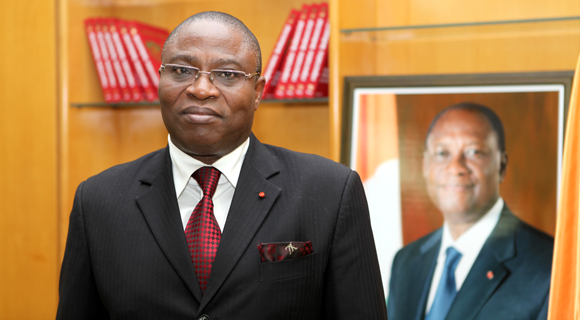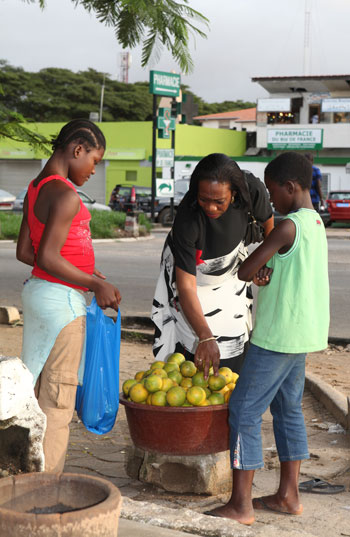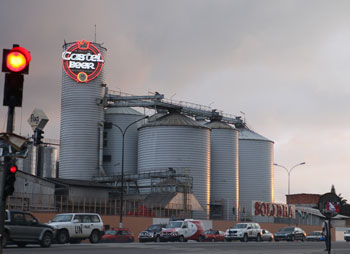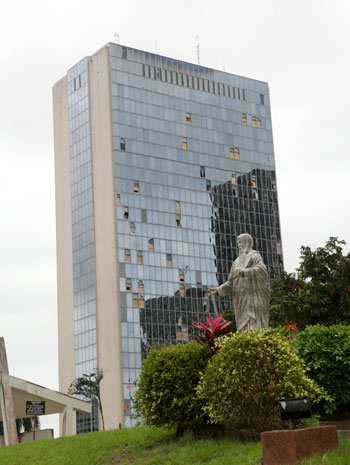UEMOA And Commerce in Côte d’Ivoire
Côte d’Ivoire is a member of the ECOWAS/UEMOA. The ECOWAS/UEMOA membership benefits include free trade and free circulation of goods and people. The UEMOA functions like one unique state even though there are many countries. Also, Côte d’Ivoire has excellent relations with Nigeria which should result into a new era of economic cooperation on a the sub-regional level.
Interview with H.E. Dagobert Banzio, Minister of Commerce of Côte d’Ivoire

Côte d’Ivoire deals in coffee, rubber, hevea, bananas, and cotton. It has already developed its mining sector and its secondary and tertiary sectors are also on the rise. What are the most attractive export markets and what are the most competitive Côte d’Ivoire products for export into UEMOA/ECOWAS and other countries of the world?
Today cocoa is the number one exported item of Côte d’Ivoire. As far as agricultural products are concerned, there is cane and hevea as well as the palm tree. The agricultural products remain important because there is a strong demand in the sub-region for fruits and vegetables with a heavy demand for bananas.
One of the main challenges with agricultural exports is that the exported products are unprocessed. In the future, Côte d’Ivoire should develop its own processing industry. There are also transformed crop products, which are traditional like «attiéké», which is in great demand in sub-regions. The devaluation has been an advantage for our economy because when the price of imports rise, local production can become competitive and replace imports.

For the economy in general, the most important element is security and the reduction of red tape to allow the people to operate easily. We are reducing irritating administrative procedures so that the people can feel comfortable and secure. These are the priorities of our government right now: security, cutting red tape, and reducing administrative procedures to allow private operators to be more competitive.
What are the strategic development objectives, new consumer’s code, and the fixing of prices for 2011?
On a national level, an entire series of measures were adopted to fight the rise of the cost of living. The company regularly monitors products, inspects retailers, and obtains information about the consumer’s reaction. That takes place within the frame of the Consumer’s Code which is a bill being discussed with consumers and that will be examined by the government before it is presented to parliament.
There is also a law to promote the competition in the market. In the past, many products were subsidized to keep the prices within consumer’s reach. Progressively, we’ve liberalized commerce to use the forces of the market and bring down the prices.
At the international level, the idea is to take advantage of all the opportunities coming from different existing partnership agreements. For example the EU, AGOA (African Growth and Opportunity Act), and US are negotiating an agreement in order for all the economic operators who are already present in Côte d’Ivoire to benefit.
What are the regional integration perspectives of Côte d’Ivoire, particularly within ECOWAS/UEMOA?
Abroad the information is often exaggerated, and the headlines in the papers or on the internet consistently portray a very negative and sinister image of Côte d’Ivoire. This is biased and flawed…
Côte d’Ivoire is a member of the ECOWAS/UEMOA. The ECOWAS/UEMOA membership benefits include free trade and free circulation of goods and people within ECOWAS/UEMOA. The UEMOA functions like one unique state even though there are many countries. UEMOA has established a common accounting system, periodic reviews of member countries’ macroeconomic policies based on convergence criteria, a regional stock exchange, and the legal and regulatory framework for a regional banking system.
Also, Côte d’Ivoire has an excellent relation with Nigeria, which is one of the giants of ECOWAS. The relationship between our two presidents – Goodluck Jonathan and Alassane Ouattara – is promising and should usher in a new era of economic cooperation on a sub-regional level. All the other economic partners, intermediate or smaller, will follow the movement.
The last point is that in Côte d’Ivoire, everything has to be rebuilt, restored and refurbished, making a lot of space for mega-projects. In Europe and other developed economies, it is impossible to undertake a large-scale investment project. On the other hand, Côte d’Ivoire has the luck of having everything; investment opportunities are enormous. For example, the government wants to build a railroad to Lagos, Dakar through Ouagadougou and to Niger. Africa has much to offer large international companies. If we develop our roads and railroads, that represents employment and markets for them. There is a potential for growth in Africa; we need to exploit it to the maximum.
Is the negative image of Côte d’Ivoire a cause of concern to you?

The information is often exaggerated abroad, and the headlines in the papers or on the internet consistently portray a very negative and sinister image of Côte d’Ivoire. This image is biased and flawed; everyone in Côte d’Ivoire is at work and the President of the republic has given firm instructions in order to obtain real, tangible results in response to the expectations of the voters.
Of course, after such a crisis, no one can pretend that the country is safe and secure. There are still marginal problems that linger. The security situation is gradually improving and the government is being proactive in order to create a business-friendly environment by cutting the red tape.
For example, yesterday in the livestock importation field, three quarters of the price of meat in Abidjan was caused by the various fees that inflated the meat price. The government stepped in and cut the fees to relieve the price. This shows the commitment to action. Everyone should feel reassured that the Ivorian government is serious about making this happen. The vision of the government is to bring the Ivorians home, invite investors, and to prosper.
What can result from the upcoming legislative elections?
The legislative elections will complete the institutional framework. The executive branch of the government is in place while the judiciary branch is being put in place; it is time to complete the framework with the legislative branch.
The President is taking this process seriously. We cannot govern a country that’s going to play the leading role in the region if the governing body is not complete. We hope to win the majority in the upcoming elections so that the parliament will be able to approve/disapprove and decree the government’s actions, therefore representing the people who elected them to do so.
y o
What is your personal philosophy regarding the markets? Are you a free-market advocate?
The company is liberal. It does not agree with quotas or tariffs, but it must also be realistic. Côte d’Ivoire has been hamstrung by the conflict. It is very difficult to compete on an equal basis with the international players.
All the advantages that result from the present political and economic agreements with Europe are being reviewed in the light of PEC and are meant to make the company more flexible. Right now, the tax system within the UEMOA is well adapted to the African context. Côte d’Ivoire is reaching maturity. There are many obligations and implications of both WAEMU and UEMOA agreements that need to be examined closely and with caution to avoid creating any embarrassing situations. Côte d’Ivoire has a republican, right wing government with a liberal approach and a human factor.